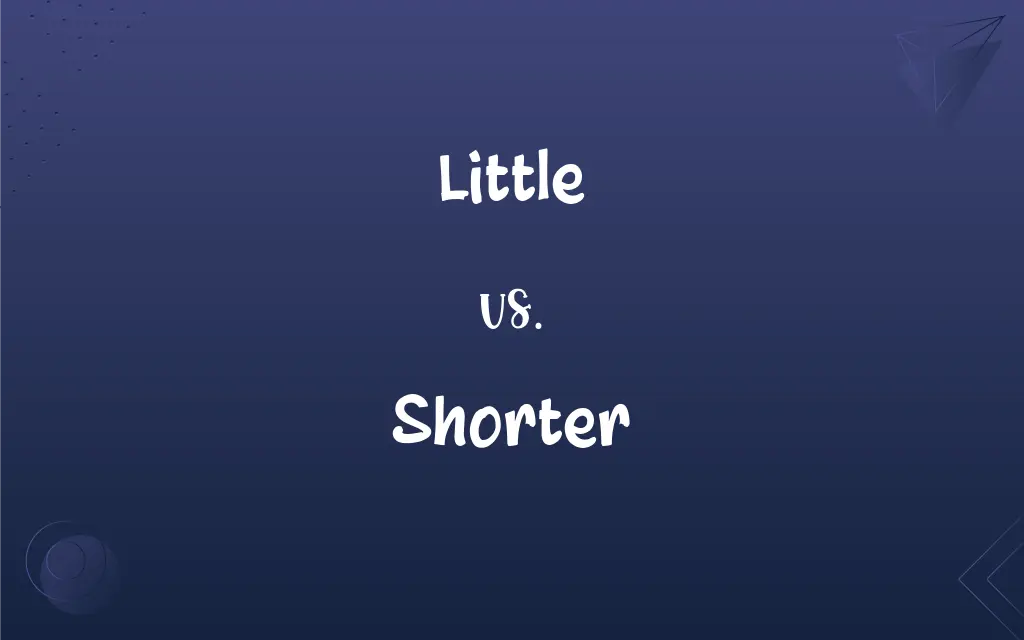Little vs. Shorter: What's the Difference?
Edited by Aimie Carlson || By Janet White || Published on January 26, 2024
"Little" refers to a small amount or size, while "shorter" is a comparative form denoting lesser length or duration than something else.

Key Differences
"Little" is primarily used to indicate a small amount or degree of something. It can be qualitative or quantitative, suggesting a minimal presence or quantity. In contrast, "shorter" is the comparative form of "short," specifically referring to lesser length or height when compared with another object or subject.
In terms of usage, "little" can modify nouns to denote limited quantity ("a little water") or describe an extent ("little importance"). "Shorter," however, is used to compare lengths or durations, always in relation to another entity ("a shorter route").
"Little" can express a subjective evaluation, often reflecting personal perception or expectation ("Little did he know..."). "Shorter," as a comparative adjective, is objective, focusing on measurable differences in length or height ("He is shorter than his brother").
"Little" can be used in various contexts, including time, quantity, and degree, while "shorter" is strictly used for comparing physical dimensions or time durations ("The days are getting shorter").
In some contexts, "little" can imply insignificance or insufficiency ("little interest"), whereas "shorter" is neutral, merely stating a fact about size or duration without implying value judgment ("She prefers shorter meetings").
ADVERTISEMENT
Comparison Chart
Basic Definition
Small in size, amount, or degree
Comparative degree of short
Usage
Describing quantity, size, or degree
Comparing lengths, heights, or durations
Context
General, varies (quantity, importance, etc.)
Specific, physical or temporal dimensions
Implication
Can suggest minimal or insufficient amount
Neutral, only indicates lesser extent
Example
"She had little patience."
"This path is shorter than the other."
ADVERTISEMENT
Little and Shorter Definitions
Little
Minor or insignificant.
It's a problem of little importance.
Shorter
Lesser in extent or distance.
He took a shorter break.
Little
Used to express sympathy or tenderness.
Don't cry, little one.
Shorter
Indicating a reduced form or version.
Read the shorter summary.
Little
Small in size or amount.
There's only a little milk left.
Shorter
Less in duration or time.
Choose the shorter route.
Little
Reflecting a small degree or extent.
She knows little about the topic.
Shorter
Comparatively less in length or height.
The shorter pencil is easier to use.
Little
Indicating a young or younger age.
When I was a little child...
Shorter
Used in comparisons of physical stature.
She is shorter than her sister.
Little
Small in size
A little dining room.
Shorter
Having little length; not long.
Little
Small in quantity or extent
A little money.
A little work on the side.
Shorter
Having little height; not tall.
FAQs
Can "little" denote emotional significance?
Yes, it can indicate a minimal emotional impact or significance.
How is "shorter" used differently from "short"?
"Shorter" is a comparative form, used to indicate something is less long or tall than another.
Can "little" be used to express affection?
Yes, especially when referring to children or loved ones.
Does the use of "little" vary across English dialects?
Yes, its usage and connotations can vary.
Can "shorter" be used for non-physical comparisons?
Yes, it can be used for time durations or abstract measures like a story's length.
Can "shorter" be used in a non-comparative way?
No, it inherently involves comparison.
Is "shorter" only used for physical dimensions?
Primarily, but it can also refer to time duration.
How does "little" differ in "little knowledge" and "a little knowledge"?
Without "a," it implies almost no knowledge; with "a," it indicates some, though small, amount of knowledge.
Is "shorter" a relative term?
Yes, it is always used in comparison to another object or subject.
What does "little" imply in a sentence?
It implies a small amount or degree of something.
Does "shorter" imply a significant difference in length?
Not necessarily; the difference can be marginal.
In what contexts is "shorter" most commonly used?
In contexts involving length, height, or time.
Can "shorter" imply inadequacy?
Rarely; it's more neutral, merely stating a comparative fact.
Does "little" always imply a negative connotation?
Not always; it can be neutral or even positive depending on context.
How does "a little" differ from "little" in emphasis?
"A little" often suggests a small but noticeable amount, whereas "little" can imply almost none.
Is "shorter" subjective or objective?
It's generally objective, based on measurable factors.
Can "little" be quantified?
Not precisely; it's often subjective or relative.
What is a synonym for "shorter"?
"Less long" or "not as tall/long."
Is "little" used in formal contexts?
Yes, but its formality depends on the context.
How does "little" function in negative constructions?
It emphasizes the absence or near-absence of something.
About Author
Written by
Janet WhiteJanet White has been an esteemed writer and blogger for Difference Wiki. Holding a Master's degree in Science and Medical Journalism from the prestigious Boston University, she has consistently demonstrated her expertise and passion for her field. When she's not immersed in her work, Janet relishes her time exercising, delving into a good book, and cherishing moments with friends and family.
Edited by
Aimie CarlsonAimie Carlson, holding a master's degree in English literature, is a fervent English language enthusiast. She lends her writing talents to Difference Wiki, a prominent website that specializes in comparisons, offering readers insightful analyses that both captivate and inform.































































